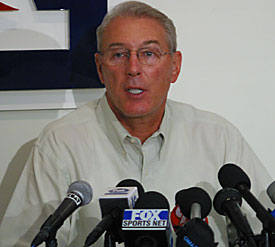 |
|
DAVID HARDEN/Arizona Daily Wildcat
|
Head football coach John Mackovic speaks at a press conference on Nov. 13 after about 40 players went to President Pete Likins to complain about his abrasive and sometimes demeaning treatment of them.
|
|
By Ryan Gabrielson
Arizona Daily Wildcat
Thursday November 21, 2002
Patience is not a virtue most college football programs have been showing their coaches in recent years, but it is something the UA's administrators and fans will likely have to muster with John Mackovic.
The cost of firing Mackovic ÷ which could result in forcing the elimination of jobs in the athletics department ÷ could keep him in place regardless of whether Pete Likins and athletics director Jim Livengood believe the coach can turn Wildcat football into a winning program.
Mackovic has three years remaining on his contract, worth more than $800,000 a year in base salary. Under his contract, if fired, the coach would be entitled to half his salary for each of the remaining years, totaling about $1.2 million, which the UA would owe in addition to the cost of hiring a new coach.
"That'd be a huge concern," said John Perrin, senior associate director of athletics. "We'd just have to find a way. We have to balance our budget and make cuts up to and including staff reductions."
The university is already making the third and final $200,000 payment due to Dick Tomey, Mackovic's predecessor, since his resignation in November 2000.
Speculation as to whether Mackovic would be replaced after only two years of leading the football program began after about 40 players held a meeting with Likins to complain about the coach's abrasive and sometimes demeaning treatment. On Nov. 13, Mackovic held a press conference to apologize to his team.
The Wildcats host ASU Nov. 29 for the last game of the season, in their fourth losing campaign in a row.
Going into the 2001 season, 15 colleges hired new football coaches including the UA, which brought on Mackovic, and ASU, which hired Dirk Koetter.
The salaries given Mackovic and Koetter made them the state's two highest-paid employees.
But even though college football coaches are being paid more and more each year, Livengood said this is happening along with decreased job security.
"It's a major problem. Salaries for a great number of years have escalated," Livengood said. "To a degree, the salaries that are out there have added to the problem of job security."
With higher salaries comes more pressure to win ÷ quickly, ASU athletic director Eugene Smith said.
"Coaches want to be compensated for that pressure, responsibility," Smith said. "The salaries have gotten out of whack and the pressure to win is there. The time frame that coaches have to win has shortened. They once had four, five, six years (to produce winning seasons, now those windows have shrunk."
In some cases, Smith said, fans and administrators start getting restless after just two losing seasons.
At both ASU and UA, revenue from men's football and basketball pay for all sports at the universities. The Wildcat's football and basketball programs generate about $13 and $12 million dollars, respectively, according to budgetary documents from the university.
But this season, along with games, the football program has been losing revenue.
The 2001 football season earned about $800,000 less than the $12,881,051 generated the previous season, documents from the athletics department show.
Perrin said attendance this year and revenue from televised games has fallen far short of expectations, with only four UA games of an expected 7 aired. This year, the UA is selling about 35,000 tickets per game in a stadium with a capacity of 56,000.
Game related costs, including security and concession stands, have already been cut as there has been less demand with smaller crowds at the football games.
All the athletics department's budget reductions have been done "without impacting the sports' budgets," Perrin said.
When losing or bowless football seasons are hurting a college's ability to pay for all its sports ÷16 at the UA ÷ there is pressure on administrators to find a solution, Livengood said. If the solution is to fire a coach, there is often a lot more financial hurt before the healing.
On top of whatever settlement the institution has to make with a former coach, it is expected the next coach would earn a lot more money than the last to show the college's commitment to the program, Livengood said. "If it's not ÎX' salary then you have not done a good job."
Despite recognition of the problem, neither Livengood nor Smith predict any changes to the established cycle of college football coaches' hiring and firing.
"I don't think (salaries are) going to go down," Livengood said. "It's easy to talk about until it's you, and I'm included in that too."
The Arizona Board of Regents will meet today and is expected to discuss Mackovic's situation during executive session, which is closed to the public. The regents are not expected to take any action.
"We're not in the business of overriding (Likins)," said Jack Jewett, president of the board. "I believe the regents are supportive of Dr. Likins' approach."

